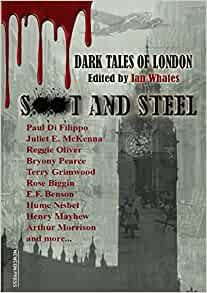Soot And Steel: Dark Tales Of London edited by Ian Whates (book review).
Editor Ian Whates provides a fascinating introduction to this book, ‘Soot And Steel: Dark Tales Of London’, telling us how the chance discovery of a slim novel written by Arthur Morrison in 1902, along with memories of his own early years in London, inspired this collection and how he came to the decision to mix classic old tales with those by contemporary authors.
Bryony Pearce gives us a strong opening with ‘Hunger’. Some monsters are not necessarily all that monstrous, they simply do what they must to survive…and dire situations can make monsters out of anyone.
The first of the reprints of classic material is ‘A Street’, not so much a story but a non-fiction vignette on the reality of life in the East End, by the aforementioned Arthur Morrison. It serves to remind the modern reader just how well off they are. The language is somewhat poetic, but not too hard to process for those who weren’t around in 1891, when it was first published.
Reggie Oliver’s ‘A Maze For The Minotaur’ impressed me greatly. The writing so perfectly captures the style of the Victorian period in which the story is set that it sits very comfortably between the two genuine Victorian tales that frame it, something so many authors of Victorian mysteries fail to achieve. It’s a crime story of sorts, in that a brutal man is dealt with in a manner that would certainly lead to a bad end for the main protagonist, if she were caught. I rather suspect that this is one of those cases that the Great Detective may have discretely allowed to pass unpunished, had he been consulted.
There’s a subtlety to Hume Nisbet’s story of an artist’s lasting obsession with his doomed model that is rarely seen in more modern writing. Published in 1894, ‘The Phantom Model: A Wapping Romance’ holds back on the supernatural denouement until the very last page.
‘The Ghost Of Cock Lane’ by Rose Biggin tells of a man accused of murder on the evidence gleaned from a fairly obvious fake séance. The subterfuge is exposed by none other than Dr. Samuel Johnson, esteemed compiler of the English Dictionary. The fact that the story is narrated by a genuine ghost, who is in no way related to the matter at hand, adds some small interest, but I found this one, while well-enough written, didn’t do a great deal for me.
Juliet E. McKenna is an author I’d been wanting to get around to reading for several years. If ‘The Hand That Rocks The Cradle’ is any indication, I am going to need to find the time soon and I will be very impressed. Charlotte, having found herself in increasingly dire straits after the death of her father, is led to ‘The Alice Street Educational Registry’ by a youthful chimney sweep. Herein, she makes the acquaintance of a pair of ladies who are going to change her life.
On the one hand, this is an excellent portrayal of the struggle of women in the days before it was considered necessary for them to be educated. On the other, it’s a weird tale which involves a subtle crossover that left me reeling from the sheer brilliance of it. McKenna doesn’t feel the need to be too obvious in letting the reader know who these ladies are, which may be partly down to their copyright status, but also serves to show how strong a writer she is, as the story would still be a very good one, even if the reader doesn’t work it out.
‘The Watercress Girl’ by Henry Mayhew was originally published in 1851. I defy anyone not to be deeply moved by this incredibly powerful fictionalised interview with an eight year-old watercress seller. Mature and practical far beyond her years, she has no time for childish things, not if she wants to survive.
I have to say that ‘Queen Rat’ by David Rix stinks! No, I’m not saying it’s badly written, nor that it’s not a good story. It’s excellent. But Rix’s skill at describing the lives of mudlarks and sewer-hunters does tend to make one long for a shower whilst reading. References to Joseph Bazalgette dates the action to around 1860, as work on his great plan to build a system of sewers to intercept raw sewage, which up until then flowed freely through the streets and thoroughfares of London, had only recently begun. While obviously necessary, this plan would put the livelihoods of those who clawed a miserable living from whatever treasures they could find in the sewage at risk.
I can’t deny that I felt a certain kinship with ‘Christopherson’. The house in which I live would be so much more spacious and comfortable, had not every conceivable space been filled with so many books that it has become nigh impossible to even find a particular volume. George Gissing wrote this tale of a well-off lover of books who had already been forced to part with the bulk of his vast collection when some bad business decisions made him destitute. His wife’s health was failing and a rich relative was willing to let them move into an empty property she owned in the country. But she wouldn’t hear of him filling the place with books! I have always loved reading stories that involve book lovers and their libraries and this one was no exception, even though it left me feeling a little depressed at my own, thankfully not nearly so desperate, situation.
‘From The Casebook Of Master Wiggins, Esq.’ is the only badly-written story in this anthology. Pretentious and somewhat pompous in style, it’s truly glorious! Obviously, I’m referring to the writing of the famed Baker Street Irregular, Wiggins, here, not his editor, Paul Di Philippo, for on this occasion young Wiggins is the chronicler, rather than Doctor Watson. It’s not too difficult to understand why this case never made it into the Strand Magazine. Wiggins and his intended, Miss Vivianne Pye, who is less enthusiastic about the idea than he is, help Holmes thwart a terrorist plot.
I have to be honest, I wasn’t all that enamoured of Terry Grimwood’s ‘Albert And The Engine Of Albion’. Prince Albert struggles to free Victoria from the influence of an Earth God, who seems as much steampunk as he is pagan. It didn’t quite work for me, although I could easily see it being the favourite of other readers.
A philosophical discussion as to the nature of time and space; infinity and eternity leads to the telling of a ghostly story involving a shade of the future in E.F. Benson’s 1922 tale, ‘In The Tube’. While certainly being a true classic of the ghost story genre it does, however, suffer from an attempt by the author to make some of his sentences eternal in a way that I fear wouldn’t pass muster in this day and age.
‘A Romance Of The Piccadilly Tube’ by T.G. Jackson is another period piece. Originally published in 1919, this reads much better than the previous story. Here we have a moral fable of sorts, but doing the right thing doesn’t always have quite the happy ending one might hope for.
One can’t really have an anthology dedicated to stories about London without The Blitz looming large. Susan Boulton’s ‘Blood And Bone’ allows us to get into the heads of several characters, ranging from a German bomber pilot; a female American news photographer in London, in search of the perfect shot; and a member of the St Paul’s watch during an air raid. When I read stuff like this, I am always left wondering how people ever coped with that level of death and destruction, even those doing the bombing.
It is perhaps fitting that, as a major inspiration for this book, Arthur Morrison should be the only author to feature twice. ‘Behind The Shade’, first published in 1894, is another story in which Morrison casts an eye on the lives of the lower classes of Victorian London. This time he gives us an example of how assumptions and gossip are, as often as not, far from the truth.
Paul St. John Mackintosh ends the anthology with ‘Southall Tantra’. I liked the way he included lots of information about the art world, without it coming over like a text book. I rather envied Derek Clare for his growing relationship with Anika Chowdhury, even if it was rather obvious how things were going to end.
All in all, this is a very good collection of stories with the central theme of London. The period pieces are well-chosen, relatively uncommon and they mesh with the new material very well. Some stories come under the umbrella of speculative fiction, some don’t, but they all complement each other nicely. Recommended.
Dave Brzeski
August 2020
(pub: NewCon Press, 2019. 260 page small enlarged paperback. Price: £12.99 (UK). ISBN: 978-1-912950-38-6)
check out website: http://www.newconpress.co.uk/info/book.asp?id=145&referer=Catalogue






